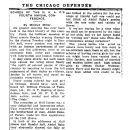Main menu
- ‘Abdu’l-Bahá’s Journey
- World Peace
- Stopping Racism in America
- Empowerment of Women
- More Principles...
- Prayer for America
Echoes Of The N. A. A. C.’s Fourth Annual Conference
By Mildred Miller
No greater meeting has ever been held in the later history of this country. From the brilliant opening at Sinai temple Sunday evening through to the closing Tuesday night in Handel hall, every session was marked with an intense earnestness of purpose, and the addresses were of an unusually high order and teaming with information and human interest.
It may come slowly, but such meetings cannot but bring about finally “the uplift of colored people of this country by securing to them the full enjoyment of their rights as citizens, justice in all courts and equal opportunities everywhere.”
Every young colored boy and girl in Chicago should have seen and heard Mr. William Pickens, of Talladega, Ala.; Mr. H. T. Kealing, of Quindamon, Kan.; and Mr. W. E. B. Du-Bois, author, scholar and editor of “The Crisis.”
The reception at Hull House was a very delightful and interesting affair. That wonderful teacher of peace and the brotherhood of man, ‘Abdu’l-Bahá, of Persia, made his first appearance at the Hull House.
In both of his addresses at Hull House and Handel hall, ‘Abdu’l-Bahá very eloquently showed the folly of discrimination on the account of the only point of difference between men, that of the color of the skin.
A garden of flowers, all of one color, would be monotonous and by no means beautiful.
The local committee deserves much credit, of course, for the arrangements for the comfort, etc., of the guests and attendants upon the N. A. A. C. conference, but yet when one looked at the ushers for the evenings at Handel hall one could not but think of ‘Abdu’l-Bahá’s garden with the one color and variety of flower.
If we are hoping for a time when we shall not be measured by the color of our skin, had we not better begin by “cutting out” these nice little discriminations among ourselves?
The young ladies who acted as ushers were lovely and this word is no criticism upon them at all; but the scheme of having young girls for ushers might have been carried just a little farther, and instead of married and maiden ladies such high school girls as Misses Esther Webster, Helen Perry and Bertha Mosely might have been added with credit to the list.









